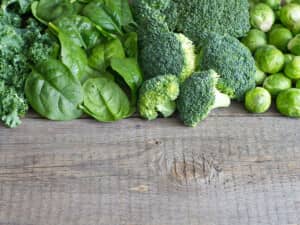
Titusville Area Hospital
An Essential B-vitamin

Folate is an essential vitamin. It is actually vitamin B-9 but usually we hear about it as foilate. The word comes from the Latin word folium which means leaf, because leafy greens are a good source of folate.
We might also see folate in a vitamin supplement, in the form of folic acid. Folic acid is the synthetic form of folate, and while this might sound like it is unnatural, the human body can in fact more easily absorb the vitamin from the synthetic form compared to the non-synthetic form of folate. Folic acid is used to fortify many different food items in the food system. If a food item has the words, “enriched grain,” it has been fortified with folic acid.
Like many of the other B-vitamins, you need folate for several important body functions, including growth and development, cell division, immune system functioning, and protein metabolism. Folate is also needed for healthy blood and to prevent anemia. Blood cells affected by folate deficiency cannot divide and end up growing too large. Folate status can also be threatened in people with alcohol-use disorder.
The Need for Folic Acid During Pregnancy

One group of people especially at risk for folate deficiency is pregnant women.
The Food and Drug Administration (FDA) mandates that enriched grains are enriched with folic acid . The reason for this is because folate is a nutrient needed especially in the first few weeks of pregnancy, before a woman can even know that she is pregnant. Folate is essential for brain development, for allowing cells to divide, and for early fetal development, especially of the spinal cord. Therefore, if a pregnant woman is deficient in folate in the early days of pregnancy, this can lead to serious birth defects called Neural Tube Defects (NTDs). Neural tube defects range in severity, and can be mild or severe. Spina bifida, for example, is a neural tube defect. After the FDA began requiring folic acid to be added into grain foods, the prevalence of NTDs dramatically decreased.
Women of childbearing age who may become pregnant should take a prenatal vitamin each day which includes at least 400 mcg of folic acid. Women in early pregnancy need extra folate to help their babies develop, so taking this before you know you are pregnant is very important. The other important thing is that taking a prenatal vitamin with folic acid daily is not going to hurt you if you are not pregnant. Your body can easily excrete extra folate.
Tips to Improve Your Folate Status:

- Take a daily folic acid supplement. For women of childbearing age who may become pregnant or are planning to become pregnant, this is essential.
- Enjoy folate-rich foods, such as:
- Oranges
- Orange juice
- Leafy green vegetables (spinach, kale, broccoli)
- Peanuts
- Legumes (pinto beans, black beans)
- Whole grain foods
- Enjoy foods that are fortified or enriched with folic acid, such as:
- Breakfast cereal
- Crackers made with enriched flour
- Baked goods made with enriched flour
- Pasta and tortillas made with enriched flour
Try to enjoy a folate or folic-acid rich food item with every meal, along with taking your supplement if you are at risk for folate deficiency.
Summary for Folic Acid Awareness Week
Folate, and in its synthetic form as folic acid, is relatively easy to incorporate into one’s diet, especially if meals already consist of leafy greens, cruciferous vegetables, and whole grains! Thanks to FDA guidelines to fortify foods with folic acid, this essential vitamin is available in a variety of foods. Its very important for woman who are pregnant or are trying to conceive to supplement daily with a prenatal vitamin that contains at least 400 mcg of folic acid to prevent birth defects. Talk to your OB/GYN or primary care provider to understand what is best for you!


